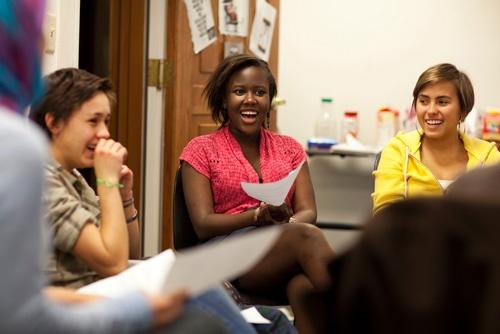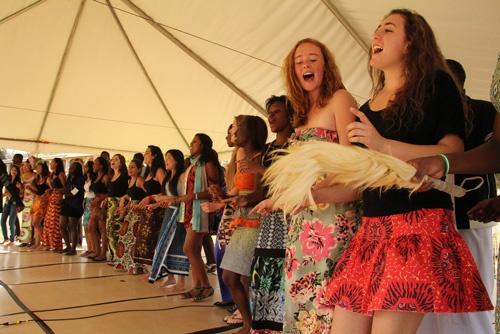“We bring students together who might otherwise remain on opposite sides of a deep historical division.” – Victoria Mora
Isolation and bigotry appear to be on the rise. How do we develop global citizens with the skills and competencies to empathize with one another?
The United World Colleges (UWC) aims to combat the problem by producing thoughtful, committed and empathetic students who are able to consider global issues from the perspective of several different cultures. This is being achieved through a curated radical diversity amongst the student body. As students are accepted from either side of deep historical divides and allowed to live and work together, they begin to appreciate their shared humanity. This encourages students to employ empathy to their decision making, which the founders of UWC hope will be used to create systems, opportunities and support for the community at large, rather than just a select few.
The Global Search for Education invited the school’s president, Dr. Victoria Mora, and Executive Director of UWC, Jens Waltermann, to talk about the importance of empathy, compassion and diversity and why it’s integral to all our futures.

“The future jobs that I imagine are filled with creative, ethical, and globally-minded leaders who dedicate themselves to constructively applying new technology to meet the basic needs of all humans.” – Jens Waltermann
Victoria, what do you think makes the UWC “schools like no other”? How would you describe your achievements so far?
At UWC, diversity is not just “window dressing.” These are schools where diversity is deliberate and central to our identity and program. In the U.S. context, diversity is often focused on race, ethnic minorities, and identity issues like sexual orientation and gender identification. Although we consider these issues to be important, we also focus on broader divides wreaking havoc globally, such as geographic and resource divides. We bring students together who might otherwise remain on opposite sides of a deep historical division. Many of our students might never have had the opportunity to interact and learn from one another’s points of view otherwise.
This diversity provokes change at UWC as students experience it when they are at an age when they are most open to friendship. As UWC, students negotiate differences within residences halls, they also adapt to multiple perspectives on how to accomplish service projects, and are encouraged to approach academic work collaboratively across linguistic, cultural, and economic divides. Eventually, our students end up not only tolerating their differences, but also begin to see the world through the perspective of people they genuinely care about.
In terms of the impact our education has, the common thread amongst our alumni is a deep empathy for others and a sense of responsibility for the common good. UWC alumni routinely work with NGOs on local and national policy initiatives, and in organizations that promote stronger communities and individuals. They lead in a variety of fields, including government, tech, and social entrepreneurship.
How is the “real world” incorporated in your daily curriculum and used to cultivate intercultural understanding and empathy?
220 UWC-USA students perform 17,000 hours of community service every year in San Miguel County and Northern New Mexico. This ranges from teaching engineering in after school programs, participating in clean-up projects, working with incarcerated youth in detention centers, and working locally in soup kitchens and homeless shelters. Like other UWCs, UWC-USA students engage with the real world just miles from their school – engagements that lead to richer, more complex learning in the classroom. For example, Yinting Zhong ‘19, a UWC-USA student from China, participated in an off-campus community service program last fall involving community gardens and a Food Oasis on the Tewa Indian reservation in Northern New Mexico. Whilst working alongside Native Americans on projects, she learned about their customs and culture. “We learned a lot about the indigenous people in the U.S. and listened to their stories,” explains Yinting. “We discussed their issues and concerns and we visited their spirit lands. Later in the fall, our English Literature teacher shared poems written by Native American poet Joy Harjo, who writes about the situations indigenous people face. After my experience on the Food Oasis project, I understood the themes of Harjo’s poems more fully.” This might be considered as one of several possible examples of how community service enriched the education of a student.

“Those who can move easily across and within the increasing diversity of the world; those who can communicate across national, religious, ethnic, and social boundaries; those who can think creatively in the face of new challenges; those who can coordinate and bring together different competencies – these will be the leaders who thrive in the future.” – Jens Waltermann
Jens, how do you envision the future of work? What are the jobs in your mind that don’t exist yet?
I envision a world that contains the diverse experiences of the present, embedded in updated technology. I’m less concerned about details such as whether we’ll have flying cars, and more concerned about whether advances in technology will be used to exacerbate or ameliorate the increasing inequalities of the present.
Obviously, more and more work will demand a familiarity with technology. The technological improvements of the present are creating a future in which good governance and management of extraordinary technological potential will demand creative thinking unlike our present demands.
The future jobs that I imagine are filled with creative, ethical, and globally-minded leaders who dedicate themselves to constructively applying new technology to meet the basic needs of all humans.
Should students feel threatened in the face of automation and robots? What curriculum improvements are needed to make schools relevant in the age of AI?
The greatest threat we’ll face in the future is not the creation of automation and robots, but rather the continued failure to utilize technology for the greater common good. Our students certainly need to be able to code to be the drivers of technology, but the bigger question is whether they’ll have the capacity to consider the ethical implications of their abilities.
Curricula still emphasizes rote knowledge, which is already infinitely accessible; knowledge becomes less and less important as technology can anticipate the questions and find its own answers – one of the principles of AI. Instead, for schools to remain relevant, they need to emphasize the application of knowledge. We need to ask difficult, open-ended questions. The social engagement with difference will lead young people to grow into adults that expand possibility and opportunity to those without it.

“The trends toward isolationism are both troubling and futile. Information, education, and economic markets are now inextricably international: the internet allows the flow of ideas across borders in unprecedented ways.” – Victoria Mora
What are the most important competencies graduates need to thrive in the future?
Clearly when our students are looking for – and creating – jobs in the next 10-20 years, they will need to have advanced competencies in the STEM fields. But as continued globalization brings humanity into closer contact, the crucial skills of future leaders – local, national, and global – to thrive in the future will be centered around intercultural and international fluency.
Those who can move easily across and within the increasing diversity of the world; those who can communicate across national, religious, ethnic, and social boundaries; those who can think creatively in the face of new challenges; those who can coordinate and bring together different competencies – these will be the leaders who thrive in the future.
Victoria, as some nations push more protectionist policies under a political trend towards isolationism and nativism, how do you think this will impact education globally?
For UWC-USA specifically, the recent tightening of U.S. visa requirements has made it more difficult to achieve the diversity that’s critical to our model of education. UWC was founded in response to the real and political walls that divided people during the Cold War. Today’s political climate reminds us that the impulses of isolationism and nativism are stronger than ever, making the UWC mission even more relevant. The trends toward isolationism are both troubling and futile. Information, education, and economic markets are now inextricably international: the internet allows the flow of ideas across borders in unprecedented ways. As a result, many thoughtful companies recognize the value of a globally educated workforce, and a surprising number of goods are manufactured in multiple countries.
The current political climate in the U.S. isn’t unique in the world. This period of pulling back from globalization gives UWC students and faculty an opportunity to work through the connections between historical and current issues. How are today’s “alternative facts” similar to the efforts made by historical governments to sway public opinion? What is the role of free press in a democratic society, and how do we protect it? These questions are not academic, yet they’re still important, and they are being addressed by our students from radically different backgrounds and perspectives in our classrooms, dining hall, and residence halls every day.

C M Rubin, Jens Waltermann and Victoria Mora